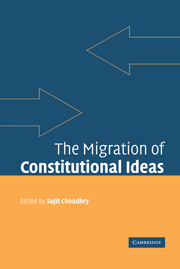Book contents
- Frontmatter
- Contents
- List of contributors
- Acknowledgements
- 1 Migration as a new metaphor in comparative constitutional law
- PART I The methodology of comparativism
- PART II Convergence toward a liberal democratic model?
- PART III Comparative constitutional law, international law and transnational governance
- 9 Inimical to constitutional values: complex migrations of constitutional rights
- 10 Democratic constitutionalism encounters international law: terms of engagement
- 11 Constitution or model treaty? Struggling over the interpretive authority of NAFTA
- 12 The migration of constitutional ideas and the migration of the constitutional idea: the case of the EU
- PART IV Comparative constitutional law in action – constitutionalism post 9/11
- Index
10 - Democratic constitutionalism encounters international law: terms of engagement
Published online by Cambridge University Press: 25 July 2009
- Frontmatter
- Contents
- List of contributors
- Acknowledgements
- 1 Migration as a new metaphor in comparative constitutional law
- PART I The methodology of comparativism
- PART II Convergence toward a liberal democratic model?
- PART III Comparative constitutional law, international law and transnational governance
- 9 Inimical to constitutional values: complex migrations of constitutional rights
- 10 Democratic constitutionalism encounters international law: terms of engagement
- 11 Constitution or model treaty? Struggling over the interpretive authority of NAFTA
- 12 The migration of constitutional ideas and the migration of the constitutional idea: the case of the EU
- PART IV Comparative constitutional law in action – constitutionalism post 9/11
- Index
Summary
Introduction
There is a tension inherent to the idea of constitutional self-government, as it is understood by many constitutional lawyers, and the claims to authority made by international law. That tension has long been covered up by the fact that international law covered merely a relatively narrowly circumscribed domain of foreign affairs, was solidly grounded in state consent, and generally left questions of interpretation and enforcement to states. Much of contemporary international law no longer fits that description. International law has expanded its scope, loosened its link to state consent, and strengthened compulsory adjudication and enforcement mechanisms. Not surprisingly, one of the most pressing questions of contemporary constitutional law is how to think about the relationship between the national constitution and international law.
In the first decades of the twentieth century, jurisprudential debates among international lawyers thinking about the relationship between national and international law focused on whether the legal world exhibits a monist or a dualist structure. Under a monist conception of the legal world, international and national law constitute one vertically integrated legal order in which international law is supreme. Dualists insist on the conceptual possibility, historical reality, and normative desirability of a non-monist conception of the legal world. Under a dualist (or pluralist) conception of the legal world, different legal systems on the national and international levels interact with one another on the basis of standards internal to each legal system.
- Type
- Chapter
- Information
- The Migration of Constitutional Ideas , pp. 256 - 293Publisher: Cambridge University PressPrint publication year: 2007
- 10
- Cited by



